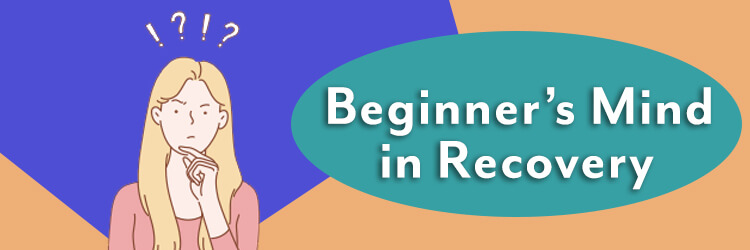[vc_row][vc_column][vc_column_text]When I got sober, my first niece was four months old. I hadn’t spent so much time with a baby before; everything was new to her. I saw parallels to my experience of new sobriety. I was doing a lot of things sober for the first time in my adult life.
At that time, I took cues from my niece about having a beginner’s mind. This a Zen Buddhist concept that means letting go of expectations and treating things as though they’re new to you.
In a way it’s a simple idea, but it’s actually hard for most of us to do. People tend to get caught up in routines and stuck in our ways. We base what we know on previous experiences—this is how we learn.
With more sobriety under your belt, it can be hard to keep a beginner’s mind about your recovery. But I think it’s important to try.
The more time you spend sober, the more you grow and change. What you need for your recovery may change along with you. For instance, in your sobriety so far, you may have always felt okay attending a specific alcohol-heavy event.
Applying a beginner’s mind to this situation can be as small as slowing down to check in with yourself before attending the event. You probably did this naturally the first time the event came up when you were sober. Even if you’ve felt okay with it for 10 years, that doesn’t mean you always will.
Imagine your shoulders tense and anxiety creeps up when you think of going. You may brush these reactions aside if you act on autopilot. Responding to these feelings—and making a plan to support your recovery—could spare you a very difficult night, or potentially even a relapse.
This could apply to larger ideas about your recovery. If you know something works, continue doing it. But if you feel stuck, using a beginner’s mind can be helpful.
The whole five years I’ve been sober, I haven’t used AA. I tried meetings during a previous, short-lived attempt at sobriety. I knew for sure I didn’t connect with it. Fast-forward to recently, when I felt like I needed to add something new to my recovery.
I resisted the idea of attending AA meetings. After five years, I felt like an expert in how to “do” my sobriety. And I had known, for sure, that AA meetings weren’t it. It took a while to open myself up. I ended up going to a meeting. While I still didn’t think it was my thing, I’m not closed off to the idea of trying different meetings in the future. There are so many in my city, it seems presumptuous to assume I would never connect with any.
You can be absolutely sure of what works at one point in your life and need something entirely different another time. It’s important to remember that this doesn’t make either thing untrue. You really were sure before. People change. If you don’t have a beginner’s mind, you might be utterly convinced something “isn’t for you” that could have been helpful.
Sometimes resistance is not about giving up a preconceived belief. Sometimes it’s about not knowing how to see something anew when you’ve already experienced it. The biggest tip I can give is to slow down. Most of the time when we’re acting mindlessly we’re rushing through something. Slowing down will inherently make you stop and notice.
Another thing is to be conscious of open-endedness when asking yourself questions. For instance with my AA situation, instead of asking myself, “will AA work for me?”, I might ask questions like, “Why do I think AA won’t work for me?”; “What was it about previous AA meetings that made me think that?”; “What, if any, aspects of AA might I connect with?”
I’m more likely to answer the first question with what I already think I know. A beginner’s mind means asking the types of questions you’d ask if you’d never been to an AA meeting and were weighing the pros and cons.
It’s easy to get stuck in autopilot. I am guilty of it often. The COVID-19 pandemic can be an opportunity for us to practice beginner’s mind; our routines are constantly being shaken up anyway. Instead of letting that throw us off, we can work with it.
If you are struggling with a substance use or mental health disorder during this difficult time, there is hope. TruHealing Centers is open throughout the pandemic, with hospital-grade sanitization and telehealth options. At our recovery centers across the country, we will help you build coping skills and live a mindful life in long-term recovery. Call an admissions specialist at 410-593-0005.[/vc_column_text][/vc_column][/vc_row]









